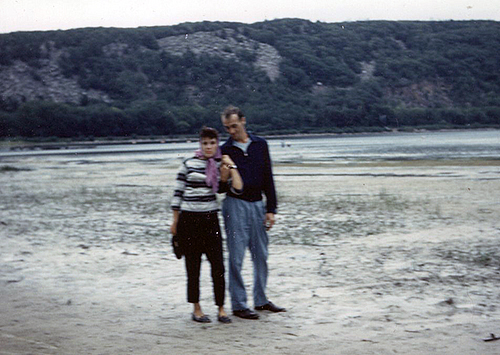Part 1 | 2 | 3 | 4 | 5 | 6 | 7 | 8 | 9 | 10 | 11 | 12 | 13 | 14 | 15 | 16 | 17 | 18 | 19 | 20 | 21 | 22 | 23 | 24 | 25
During the 1990s, a few years before my father, Dave, passed away in December of 2000, he wrote a 35-page autobiography. Excerpts from it will be published here, as companions to the diaries my mother, Dorothy, kept in 1945 and 1946—the year she met Dave. My dad was born in 1927, in Hamilton, Ohio. The family eventually moved to the south side of Chicago.
Part 24
Goodbyes
June 19, 1963. A hot, sunny Wednesday afternoon, and the day of my son's graduation. Dorothy, David and I walked the four blocks to Mt. Greenwood Elementary School, and took our seats on the folding chairs in the stuffy, sun-drenched gymnasium. During the lengthy ceremony, we watched David receive his diploma.
For years, Dorothy, now 35 years old, had been seeing a doctor about pain in her hip. The physician's diagnosis was arthritis. Today, however, after we returned home in the summer heat, the pain had grown much worse. Clearly, it was more than arthritis.
A few days later, we visited the doctor, who then ordered tests. What they revealed was a slow-growing cancer around her hip bone. Surgery to remove the growth followed, but soon after that Dorothy developed a lesion on her shoulder.
On a Friday morning, we drove to the offices of Drs. Hark—father and son—who had operated on Dorothy's hip. They were able to remove the shoulder lesion in the office. Afterwards, we sat down with them.
“I want the truth about my condition,” Dorothy said, to the physicians. The elder Dr. Hark spoke.
“Dorothy, the cancer is widespread. We do not think you would benefit from any further treatment, surgical or radiation. Our determined opinion is that you can expect to live for about six months.”
Dorothy accepted this grim news in a very calm, stoic, matter-of-fact manner. She and I were determined that we would do the best we could in the time remaining to us. We eventually decided to try radiation anyway. Amputation was suggested–an option Dorothy rejected.
We also chose not to disclose the doctors' determination to our son David, who was now 14 years old. He would know of the surgery, and the treatments, but would not be aware of the ultimate fate that awaited his mother. He'd spend much of the months ahead with his cousins at Dorothy's sister Louise's home in the suburbs, when he wasn't at school.
Over the next few months, into the fall and winter, Dorothy's condition varied between extreme pain and relapses into feeling normal. We brought our bed downstairs into the addition we'd built two years before, so that she could enjoy the light and tv, etc. when she wasn't able to move around. On better days, we took short trips in the car, sometimes to her favorite places.
When David began school in the fall, she felt good for a time, fixing dinner, and doing things she enjoyed. As fall turned to winter, I took a leave from work to spend all my time at home. Meanwhile, Dorothy's mother, Pauline, had become gravely ill, also from cancer, and passed away in December. Dorothy's condition, by this time, was much more dire. Between myself and her family, we chose not to disclose her mother's death, fearing it would only make things worse. Although by now she was seldom asking about anyone.

Dorothy's brother Lou at her left; to her right, her mother and sister, Pauline and Louise, in 1962.
I had hired a nurse, but Dorothy's brother and sister were also very helpful during this time, allowing me to get some rest. Some family members did not understand why Dorothy was at home, and not in a hospital. Being at home was her choice. It was where she wanted to live the remaining portion of her life. The hospital could do her no good, she said. I've been forever grateful that she made that decision, and that I was able to be a part of her death, as I was part of her life.
In the last weeks of her life, Dorothy was in and out of coma. I sat by her bed, with the nurse or myself administering morphine and oxygen when needed. In her soft, raspy voice, she whispered goodbye in David's ear as he left to spend the week at Dorothy's sister's home. Early on a Friday morning in March, Dorothy's brother Lou, who had been sitting up with her, woke me, to say that she'd passed away.
I felt no sadness, only relief that it was over for her. I remember saying to Lou that everything around us—the chairs, the pictures—were all the same, but that she was gone. How could it be that they stayed the same, but at the same time nothing would ever be the same?
Often, when Dorothy was in extreme pain, I'd thought about loading up the syringe with morphine and ending her suffering. But I couldn't do it. Not out of hope that she'd maybe recover and be well again, but with the thought that this was a decision that she and God would make.
I loved Dorothy with all my being. During the not quite 17 years we were married, there had never been a time in my imagination when we would ever not be together.

Dorothy and Dave, around 1962.
* * *
End of Part 24
Part 1 | 2 | 3 | 4 | 5 | 6 | 7 | 8 | 9 | 10 | 11 | 12 | 13 | 14 | 15 | 16 | 17 | 18 | 19 | 20 | 21 | 22 | 23 | 24 | 25
|

